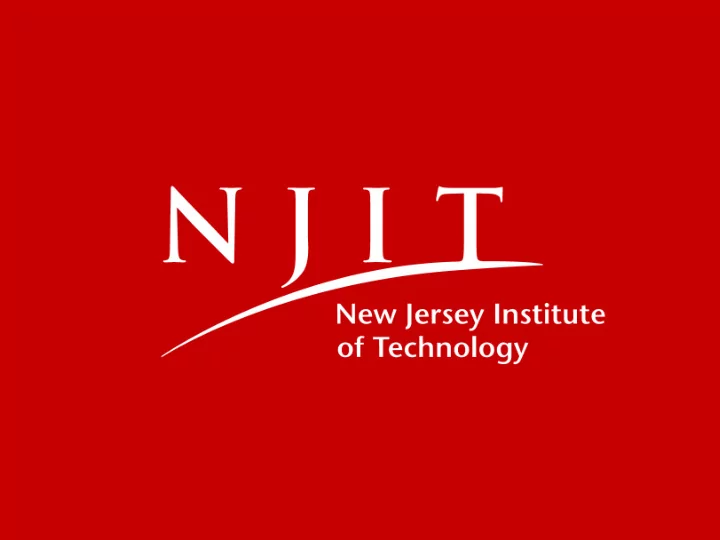

Recruitment for Out-of-State Students & Scheduling Faculty Senate Updates Dr. Wendy Lin-Cook March 28, 2019
Enrollment Funnel 3 March 28, 2019
Freshman – Prospect/Inquiry Stage • Out-of-State Student Search – Purchase names of high-achieving high school students • New Jersey – 37,644 (+23%) • Non New Jersey – 138,796 (+109%) – New York, Pennsylvania, Connecticut, Maryland, Delaware, Washington DC, Virginia, Florida, California • International – 1,524 (+10%) • Out of State/International Recruitment Travel – High school visits and college fairs • New York, Pennsylvania, Connecticut, Maryland, Delaware, Washington DC, Virginia, Florida, California and Texas • China, India, Taiwan, South Korea, Vietnam, Malaysia, Indonesia, Russia, Ukraine, Colombia, Brazil – Recruitment literature • Additional recruitment activities – Online Search Platforms such as Naviance, Niche – Digital and Traditional Advertising 4 March 28, 2019
Applicant/Admit Stage • Overall Applications – 8,736 (Fall 2019) vs. 7,923 (Fall 2018) • Out-of-State Applications – 1,547 (Fall 2019) vs. 1,117 (Fall 2018) • International Applications – 639 (Fall 2019) vs. 548 (Fall 2018) • Personalized Portal with personalized financial aid information • NJIT Experience Days (on-campus and virtual) • Virtual yield events • On-line math placement exams 5 March 28, 2019
Transfer Students • Prospect Stage – Regional Transfer Scholarship – Purchase name • Phi Theta Kappa – Recruitment Travel • Community colleges in New Jersey and surrounding states – Advertising, posters combined with Digital marketing (geofencing) at targeted NJ and neighboring community colleges 6 March 28, 2019
Graduate Students • Prospect Stage – Purchase name • GRE, GMAT, TOEFL – Outreach to NJIT students and alumni – Recruitment Travel • Regional graduate fairs (NJ, NY, PA) • Professional conferences (NSBE, SWE, Grace Hopper, etc.) • International recruitment • Overseas agents – Digital marketing • Google Ads • Social Media Ads – Traditional advertising • Transit Ads • Billboards • Publications 7 March 28, 2019
Application Results • Freshman Applications – Fall 2019 – Out of State: +84% – International: +6% – New Jersey: +5% • Transfer Applications – Fall 2019 – International: +12% • Graduate Applications – Fall 2019 – International: +21% 8 March 28, 2019
Scheduling
Scheduling Models Centralized Scheduling Decentralized Scheduling (Fall 2008 to Fall 2016) (Spring and Fall 2017 ) • Academic department provides • Academic department admin faculty data and Registrar has to coordinate among each creates schedule other to develop schedule • Ensures fairness and conflict • Room assignment happens at free for all parties by taking all the end of the process create variables into holistic dispute for desirable time and consideration at once space • Balanced classroom utilization • More academic department control • Less academic department control
Current NJIT Scheduling Model Hybrid ( Spring 2018 to current) • Centralized Freshmen Scheduling • Decentralized Upper level and Graduate courses • Disconnect between Freshmen and Upper Level course • Insufficient time available to vet the schedule prior to posting on the web
Schedule Modifications Requests
Fall Schedule Timeline Centralized Decentralized Hybrid Schedule December Academic Department creates Academic Department submit Academic Department submit freshman faculty and schedules based on faculty and January faculty and course information. course information. departmental needs. Registrar reviews submission and Registrar takes department creates fall schedule (all created schedules and assigns Registrar reviews submission and creates freshman fall population) taking into rooms. Department has to re- February schedule taking into consideration all space limitations, consideration all space limitations, assgn faculty when rooms are curriculum conflict-free blocks and faculty avaibilities. curriculum conflict-free blocks and not available. Departments faculty avaibilities. negotiate among each other for available space. Fall schedule is Academic Department create schedules based on faculty Fall schedule is distributed to the distributed to the academic and departmental needs for upper level undergraduate academic department for review March department for review two and gradate level classes. Registrar takes department one month prior to April weeks prior to April Registration. created schedules and assigns rooms. Department has to Registration re-assgn faculty when room are not available. Departments negotiate among each other for available Negotiation for space and conflict- April space. Fall schedule is distributed to the academic free schedules among Limited changes as needed department for review two weeks prior to April department continues until fall Registration. schedule opens. Negotiation for space and conflict-free schedules among May to September department continues until fall schedule opens.
Recommend
More recommend